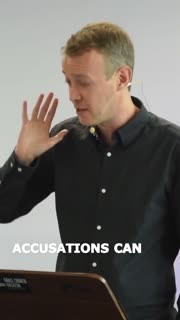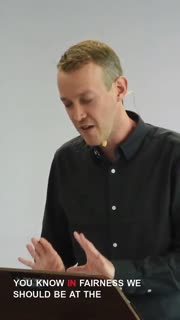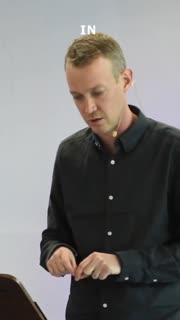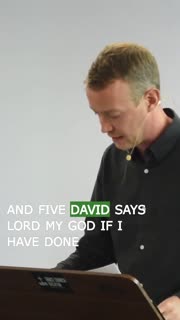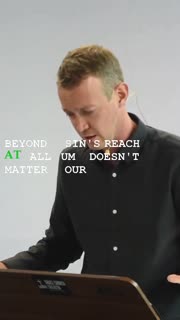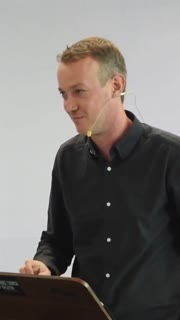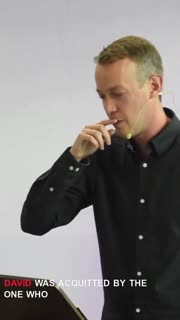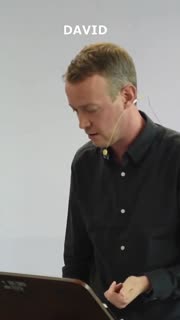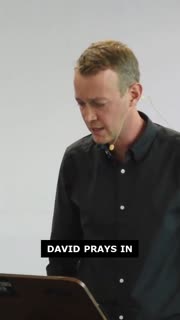Seeking Justice and Vindication Through Faith in God
Devotional
Sermon Summary
Bible Study Guide
Sermon Clips
1. "False accusations can be tragic. Christians historically have also been at the receiving end of false accusations. In the early church, a lot of people misunderstood Christianity and they said all kinds of stuff. They said you Christians, you're guilty of incest and what they've done is they've misunderstood where the Bible says that we're brothers and sisters in Christ and Paul says the end of one Corinthians greet each other with a holy kiss." [03:07] (28 seconds)
2. "We should be at the receiving end. It should be our life should be marked as believers in Christ by sacrifice to the extent that if he's not risen from the dead then our life is in vain. You know, Paul even says that he says if we put our hope in Christ for this life we and he's not real now Paul was convinced Jesus rose from the dead as we are but if we put our hope in Christ for this life only and he's not true we should be pitied more than anyone else." [06:17] (37 seconds)
3. "David seeks refuge in God. David says Lord my God I seek refuge in you save me from all my pursuers and rescue me or they will tear me like a lion ripping me apart with no one to rescue me. There's a lot at stake here isn't there you feel the intensity in these verses David's the people that are pursuing David will rip him to shreds will kill him people are thirsty for his blood what does he do he remembers his God is his personal God." [09:37] (41 seconds)
4. "I found that so helpful in life when I pray in my own head all the other thoughts just cluster in and sometimes just it just becomes this mess when I say things out loud and I declare to myself the truth that I know is from scripture it's powerful it's really powerful I encourage you to do that it seeks refuge in God." [11:32] (20 seconds)
5. "David examines his own heart and life. David says Lord my God if I have done this if there is injustice on my hands if I have done harm to one at peace with me or have plundered my adversary without cause may an enemy pursue and overtake me may he trample me to the ground and leave my honor in the dust in other words he says if it was me if it was my fault if I had really done this if I'm the one who's driven Saul out and it's down to me if there's injustice on my hands God let me have what let me receive the punishment that I need to have." [13:03] (47 seconds)
6. "No one is beyond sin's reach at all. Doesn't matter our giftings or our ministries or even our track record you know our upbringing doesn't matter doesn't have a bearing Paul's words are true whoever thinks he stands must be careful not to fall be wary that you don't fall no one's you know sadly I can think of people now who have had ministries who've influenced me personally who've walked away from the Lord and done things I didn't think they would do and a lot of them are still walking with God now and have been restored in forgiveness and know God's love in their lives and repented of that sin." [14:30] (43 seconds)
7. "David asks God to act. David says rise up Lord in your anger lift yourself up against the fury of my adversaries awake for me you have ordained a judgment he's saying I'm the king of Israel people are attacking the king of Israel if you were here when I was preaching on psalm 2 a few weeks ago God rules through his anointed king so an attack on God's anointed king is an attack on the Lord himself so David here can pray and say Lord pour out your wrath here respond in anger because as they attack me if I'm blameless before you as they attack me they're attacking you." [19:11] (47 seconds)
8. "David was acquitted by the one who examines the thoughts and emotions as the righteous God. Wow hear that description of God just let that just just the power of that let that sink in to your soul the one who examines the thoughts and emotions is a righteous God you know he knows our real intentions with my children there are times where one of them runs to me and says dad this one's done this and I have to go to the other one what happened and I have to get I have to get them both you understand both points of view because often there's a bit of exaggeration on one part or the other and there's a little bit of spin oh you didn't tell me you were the one who did this that first oh you didn't tell me that this happened you know there's often a spin isn't there there's often just intentions and thoughts just being twisted a tiny bit and but God cuts through everything cuts through everything he sees thoughts and intentions and emotions." [22:21] (72 seconds)
9. "David says it this way he says later in the psalms he says don't bring your servant into judgment because no one alive is righteous in your sight no one is completely right in your sight no one is completely right in your sight in God's eyes and he sees it all if you're outside of Christ if you don't know Jesus as a savior that should scare you a bit God sees right through he knows everything he's a righteous judge and we can't stand we can't stand on our own it's deceit in our hearts." [24:00] (41 seconds)
10. "David prays in verse 9 let the evil of the wicked come to an end but establish the righteous establish the righteous how are we as God's people going to be established how are we going to be established as righteous people because of Jesus Jesus says this I'm coming again to take you to be with me so that where I am you may be also he will come back for you if you trust in Jesus and you will be with him and you will he will take you to his place and you will be established with him forever." [30:58] (38 seconds)
Ask a question about this sermon
2. "We should be at the receiving end. It should be our life should be marked as believers in Christ by sacrifice to the extent that if he's not risen from the dead then our life is in vain. You know, Paul even says that he says if we put our hope in Christ for this life we and he's not real now Paul was convinced Jesus rose from the dead as we are but if we put our hope in Christ for this life only and he's not true we should be pitied more than anyone else." [06:17] (37 seconds)
3. "David seeks refuge in God. David says Lord my God I seek refuge in you save me from all my pursuers and rescue me or they will tear me like a lion ripping me apart with no one to rescue me. There's a lot at stake here isn't there you feel the intensity in these verses David's the people that are pursuing David will rip him to shreds will kill him people are thirsty for his blood what does he do he remembers his God is his personal God." [09:37] (41 seconds)
4. "I found that so helpful in life when I pray in my own head all the other thoughts just cluster in and sometimes just it just becomes this mess when I say things out loud and I declare to myself the truth that I know is from scripture it's powerful it's really powerful I encourage you to do that it seeks refuge in God." [11:32] (20 seconds)
5. "David examines his own heart and life. David says Lord my God if I have done this if there is injustice on my hands if I have done harm to one at peace with me or have plundered my adversary without cause may an enemy pursue and overtake me may he trample me to the ground and leave my honor in the dust in other words he says if it was me if it was my fault if I had really done this if I'm the one who's driven Saul out and it's down to me if there's injustice on my hands God let me have what let me receive the punishment that I need to have." [13:03] (47 seconds)
6. "No one is beyond sin's reach at all. Doesn't matter our giftings or our ministries or even our track record you know our upbringing doesn't matter doesn't have a bearing Paul's words are true whoever thinks he stands must be careful not to fall be wary that you don't fall no one's you know sadly I can think of people now who have had ministries who've influenced me personally who've walked away from the Lord and done things I didn't think they would do and a lot of them are still walking with God now and have been restored in forgiveness and know God's love in their lives and repented of that sin." [14:30] (43 seconds)
7. "David asks God to act. David says rise up Lord in your anger lift yourself up against the fury of my adversaries awake for me you have ordained a judgment he's saying I'm the king of Israel people are attacking the king of Israel if you were here when I was preaching on psalm 2 a few weeks ago God rules through his anointed king so an attack on God's anointed king is an attack on the Lord himself so David here can pray and say Lord pour out your wrath here respond in anger because as they attack me if I'm blameless before you as they attack me they're attacking you." [19:11] (47 seconds)
8. "David was acquitted by the one who examines the thoughts and emotions as the righteous God. Wow hear that description of God just let that just just the power of that let that sink in to your soul the one who examines the thoughts and emotions is a righteous God you know he knows our real intentions with my children there are times where one of them runs to me and says dad this one's done this and I have to go to the other one what happened and I have to get I have to get them both you understand both points of view because often there's a bit of exaggeration on one part or the other and there's a little bit of spin oh you didn't tell me you were the one who did this that first oh you didn't tell me that this happened you know there's often a spin isn't there there's often just intentions and thoughts just being twisted a tiny bit and but God cuts through everything cuts through everything he sees thoughts and intentions and emotions." [22:21] (72 seconds)
9. "David says it this way he says later in the psalms he says don't bring your servant into judgment because no one alive is righteous in your sight no one is completely right in your sight no one is completely right in your sight in God's eyes and he sees it all if you're outside of Christ if you don't know Jesus as a savior that should scare you a bit God sees right through he knows everything he's a righteous judge and we can't stand we can't stand on our own it's deceit in our hearts." [24:00] (41 seconds)
10. "David prays in verse 9 let the evil of the wicked come to an end but establish the righteous establish the righteous how are we as God's people going to be established how are we going to be established as righteous people because of Jesus Jesus says this I'm coming again to take you to be with me so that where I am you may be also he will come back for you if you trust in Jesus and you will be with him and you will he will take you to his place and you will be established with him forever." [30:58] (38 seconds)
